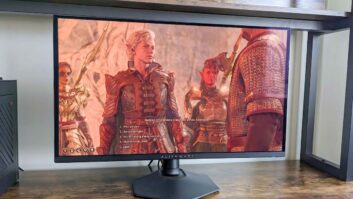One need not dig deep to uncover the sad state of affairs of the economy. Consumer electronics, while not hit as hard as many other sectors, has nonetheless been feeling the pinch of the current recession, as evidenced by recent layoffs and dismal earnings reports.
One shining star, however, that continues to burn steadily in the CE industry is gaming accessories. Gaming accessories rose 11 percent when comparing January 2008 with January 2009, according to The NPD Group, which released its yearly findings for gaming and gaming accessories earlier this month.
“The entire video games industry saw an increase in sales last year, even during the turbulent fourth quarter,” Anita Frazier, NPD’s industry analyst for toys and video games, told TWICE. “So accessories wasn’t the only part of the video games industry to enjoy success. With all the new hardware being sold, it’s natural that consumers would need additional controllers and other accessories to fully enjoy the systems, and, of course, there were some very high-profile games like Guitar Hero, Rock Band and Wii Fit, to name three, that drove accessory sales as well.”
TWICE spoke with several gaming accessories manufacturers, most of whom confirmed the success of their wares in spite of the gloomy economic outlook. Various reasons were suggested for the success, most centering around two theories: one, the demographic of most gamers — children, teenagers and young adults — has not been hit as hard by the recession because its income has not changed. And, two, more people are staying home in order to save money, and they said gaming offers a low-cost form of entertainment.
Cindy Araujo of Macally Peripherals summed up both these premises when she said, “The target demographic is teens and young adults who could be living at home and working part- [or] full-time with more disposable income. The cost of accessories is a small indulgence during this tough economic time.”
SteelSeries, which announced last week it would be selling three of its SKUs through Best Buy, has been seeing unprecedented success of its gaming accessories, said CEO Bruce Hawver.
Hawver spoke with TWICE last week about its Best Buy announcement as well as the company’s plans for 2009. Selling through Best Buy is part of a three-pronged plan by SteelSeries, he said.
“You’ll see us continue to focus on three areas — expand our retail distribution footprint, expand our product portfolio … and you’ll see some more activities to promote the gaming community,” Hawver said.
When asked about the company’s plans to weather the recession currently gripping much of the nation, Hawver said SteelSeries isn’t “feeling [the recession].”
“We’re one of the lucky ones,” he said. “We’re up 75 percent year over year, and we’re up over 100 percent in North America. We’ve seen great expansion in our retail distribution footprint … We are anticipating a good year. With broadband penetration expanding to most households, and the fact you have gaming as much as a social activity for the younger generation in particular, I think people are spending more time [gaming].”
Stefan Betesh, auto, audio and video entertainment VP for Sakar, echoed SteelSeries’ optimism for its gaming accessories sales, saying the company’s experience had been a “whirlwind” in the past year. “The need for accessories to spice up the gaming experience for the consumer has been recession proof. The lower-cost, easy-to-buy accessories have been best sellers at retail. The gaming industry will succeed because video games offer low-cost entertainment for kids and adults. Impulse items for the Nintendo consoles have outsold all other accessories 5-to-1 and will continue going forward as they bring more innovative and easy-to-play games to market.”
Gaming accessories are not completely immune to these tough times, however, although they likely stand a better chance of making it through the recession without too much damage. Bill Jukes, Microsoft Hardware’s gaming product marketing manager, acknowledged that the gaming accessories are “proving to be a bit more resilient to the current economic situation, but [they are] not un-affected.”
“For the U.S. market in general the input devices for PC categories have ‘weathered’ the economic situations better than other consumer electronics categories in terms of year-over-year growth,” Jukes said. “For the PC gaming peripheral market we have seen less deceleration of year-over-year declines than some other categories. In fact, the PC gaming peripherals market has been relatively flat while other categories have seen declines.
“However, the economic situation has had an impact on gaming vs. our projected growth from a year ago for the market. Specific to our Microsoft growth performance for PC gaming peripherals, we have been outpacing the market and growing … There have been several published articles I’ve read, and it seems that gaming is a popular activity or escape during these times but spending has still been curbed. I’ve read a couple of articles explaining that many gamers are still buying more ‘game titles’ online or at retail but they are buying used or highly discounted games. So the purchase activity is still up and active but we are seeing a much more price-conscious purchase behavior.
“Further, I don’t think gaming peripherals or game titles are avoiding the economic situation but it has been lagging in terms of market decline impact compared to many other categories. I’m not an economist but I think this similar resilience to the economy for gaming-related categories will continue but still be affected,” he said.













